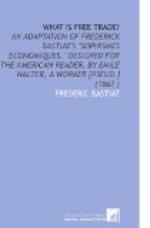Visit the fields, work-rooms, manufactories, shops; look above, beneath, and around you; investigate what is going on in your own establishment; observe your own conduct at all times, and then say which is the principle that directs these labors, these workmen, these inventors, these merchants; say, too, which is your own individual practice.
Does the farmer make his clothes? Does the tailor raise the wheat which he consumes? Does not your housekeeper cease making bread at home so soon as she finds it more economical to buy it from the baker? Do you give up the pen for the brush in order to avoid paying tribute to the shoe-black? Does not the whole economy of society depend on the separation of occupations, on the division of labor; in one word, on exchange? And is exchange anything else than the calculation which leads us to discontinue, as far as we can, direct production, when indirect acquisition spares us time and trouble?
You are not, then, men of practice, since you cannot show a single man on the surface of the globe who acts in accordance with your principle.
“But,” you will say, “we have never heard our principle made the rule of individual relations. We comprehend perfectly that this would break the social bond, and force men to live, like snails, each one in his own shell. We limit ourselves to asserting that it governs in fact the relations which are established among the agglomerations of the human family.”
But still, this assertion is erroneous. The family, the village, the town, the county, the state, are so many agglomerations, which all, without any exception, practically reject your principle, and have never even thought of it. All of them procure, by means of exchange, that which would cost them more to procure by means of production. Nations would act in the same natural manner, if you did not prevent it by force.
It is we, then, who are the men of practice and of experience; for, in order to combat the interdict which you have placed exceptionally on certain international exchanges, we appeal to the practice and experience of all individuals, and all agglomerations of individuals whose acts are voluntary, and consequently may be called on for testimony. But you commence by constraining, by preventing, and then you avail yourself of acts caused by prohibition to exclaim, “See! practice justifies us!” You oppose our theory, indeed all theory. But when you put a principle in antagonism with ours, do you, by chance, fancy that you have formed no theory? No, no; erase that from your plea. You form a theory as well as ourselves; but between yours and ours there is this difference: our theory consists merely in observing universal facts, universal sentiments, universal calculations and proceedings, and further, in classifying them and arranging them, in order to understand them better. It is so little opposed




